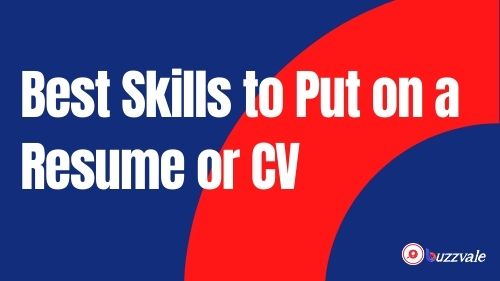8 Best Skills Employers want on Your Resume/CV
A resume provides a summary of your skills, education, work history, and other accomplishments. Some sections include a resume objective and a career summary statement. Below are some essential skills you need to list on your resume to secure your dream job.
What else is a Resume?
Resumes are the commonest document requested of applicants in job applications. CVs and Resumes should also be as concise as possible. A resume is one page long, although sometimes it can be as long as two pages.
Resumes come in a few types, such as chronological, functional, and a combination of formats. Select a design that best fits the job you are applying for and go for it.
A resume is a document created and used by a person to present their background, skills, and accomplishments.
Résumés are applicable for various reasons, but they are often also useful to secure new jobs. A typical resume has a summary of relevant job experiences, skills and education.
Meanwhile, a resume is a piece, along with a cover letter and sometimes an employment application.
A potential employer sees the job seeker with such documents and is a standard tool in screening applicants. Afterwards, the applicant may get an offer for an interview.
Whether you are writing a CV or Resume, there are a few helpful rules you should follow. It is essential to show the hiring manager how you are qualified for the job.
Besides, describe what you have to offer the organization and why you would be a terrific candidate to interview.
Understanding the Resume and the skills to put on it
A resume is an essential ingredient for applicants to secure white-collar positions. They are the first steps by corporate recruiters and hiring managers to identify the best candidates. Successful candidates get invitations for interviews for the job.
Successful resumes highlight specific events applicants have achieved in former positions. Such highlights may include cutting costs, transcending sales goals, increasing profits, and building out teams.
Interestingly, some of these skills you put on your resume or CV gives you an edge over others.
How Best to Write a CV or Resume
- CV or Resume Match. It is vital to match the Resume or CV to the applied position. This knowledge is crucial when creating a resume, but it is also applicable to a CV. Ensure that you highlight your work experience, education, and skills concerning the particular industry or job. While applying for an education job, you might have to place your teaching experience at the top of the CV. In a resume, you should include only the work experience that directly relates to the job. Besides, you can include keywords from the job description in your resume or CV.
- Make use of a template. You may want to use the template to structure your resume or CV. This strategy will give your document a transparent organization, which will help the employer quickly see your qualifications and experience. Mind you; you may not list all these recommended skills on your resume.
- Proofread and Edit. No matter the kind of CV or Resume in use, you need to edit your document thoroughly. Ensure there are no spelling nor grammatical errors whatsoever. Make sure your format is uniform. For example, if you use bullet points in one job description, use bullet points in all your job descriptions. Choose the right format for your needs. Your industry, experience, and the desired role will determine your resume format choice, e.g., chronological, functional, or a combination.
Resume Heading
The resume heading should have not only your name, email address, and mobile phone number. It must also carry your LinkedIn address or another professional community. Finally, it must show your website or blog address if you have one.
Be aware that most hiring managers will enter your name in the Google search field. Search on your own and see if you can optimize your results. Even if you cannot adjust what the site shows, you can decently hide any youthful faux pas.
Best 8 Skills to List on Your Resume:
1. List the skills you possess.
Create a master list of all your acquired skills, both hard and soft gifts. Think of the things you learned and prospered in a while in school. Others may include the activities you did after school (such as sports, arts, and clubs).
Besides, it may include some of the experiences you gained at the various jobs you have done. Other ways to identify your included skills on your resume include the following steps:
- Consider the awards and achievements you received and the skills you used to gain them.
- Ask former colleagues and mentors to help you figure out certain things
- Reach out to the professionals in the field for advice
Note that if you are still learning a particular skill (for example, JavaScript), it is unnecessary to list it.
2. Read carefully through the Job Description by visiting the Company Site.
Job descriptions are priceless when it comes to writing the best resume. Reasonably, they usually have the “Requirements” or “Key Skills” section, where the companies list the applicants’ expected skills.
However, companies also often list the necessary skills in the descriptions of the company and the position. By observing the job description, you place the most relevant skills on your resume.
A candidate can deduce that time management and communication skills are essential for the job. These are some of the skills to list on your resume or CV.
Another job description for a motor technician may require successful candidates to prepare all reports and forms with work assignments. This fact means that the candidate should have administrative skills as well as attention to detail.

3. Adjust your CV or Resume to suit the company needs
For information on the company’s values, and the required soft skills, check out their site. Alternatively, you can search for a careers page through LinkedIn or other social media platforms.
Nevertheless, you will be able to include the most relevant soft skills for the application. You may not list all the skills you think of on your CV or resume.
As a result, if applying to this company, candidates should emphasize technical skills and soft skills. Soft skills, in this case, may include creative thinking, leadership, and teamwork.
Candidates applying to some companies may have to emphasize soft skills like customer service and active listening. Others may include paying rapt attention to details.
Please make a list of the required skills and compare them to your master list. This step is essential because you need to show your relevance to your application’s specific duty.
4. Redirect your skills to the company or position.
Compare your master-list to the list of gleaned skills from the job description, and add matching skills to your resume. If you forget to add some skills to your master list, go ahead and add them to your resume.
Nevertheless, remember to be honest. Besides, the process may require you to elaborate on your skills in your interview.
However, it is not advisable to list the skills you are currently learning or hope to have. Recruiters will then expect you to deliver on any skill you list in your skills section.
5. List your critical skills in a special section of your resume.
There are different ways to format your skills list, but you will want to have a separate section. Besides, the reason is that recruiters can see straight away how you are fit for the job position.
This section is generally referred to as “Additional Skills.” It can be applicable in listing all the relevant abilities not readily evident in your Work History section.
Remember also to list your most important qualifications and be specific. It can also help separate your skills into categories, perhaps “hard skills” and “soft skills.”
Also, try not to use more than ten skills at maximum. Besides, you will usually have 1-2 pages to show the details of all your experience, qualifications, and abilities.
Furthermore, the recruiter is usually also strapped for time. In other words, they will more likely notice a short, precise list of relevant skills. On the other hand, they can also easily spot an over-detailed CV.
Be specific when listing your skills. Instead of just listing a general proficiency, like “expert computer skills,” try to be specific with your wording.
Typical usage may include expressions like “skilful with Adobe Photoshop, Microsoft Word, and Microsoft PowerPoint.”
6. Boost your skills in the Experience section.
The experience section of the applicant’s resume should be achievement-oriented. The reason is to display how you have used your skills to produce satisfactory results in your previous jobs.
Moreover, this section reinforces your experience and proves that you can use your real-life work situation skills.
To create a tremendous achievement-oriented work experience section, you can use the Problem, Action, Result (PAR) method:
- Problem: Identify an issue at your last job place.
- Action: Show how you applied a skill to provide a solution to the problem.
- Result: Highlight the positive effects of your taken action.
Once you have drafted this section, create achievement-oriented bullet points to highlight your chosen skills. You can also add figures, percentages, or other bits of data to quantify your skills.
For instance, you may mention that you implemented a new project management software that increased your team efficiency by 20%. This quantifiable fact already highlights your project management skills.

7. Highlight your most relevant skills in the Resume Profile.
The resume profile is a concise paragraph of your resume that gives an overview of your career. Also, it explains why you are the right candidate for the position for which you are applying.
You can either write this as a resume summary or as a resume objective. By the way, a resume summary works for an experienced candidate. On the other hand, resume objectives are more appropriate for entry-level applicants.
However, remember to include two or three most relevant skills that the employer expects when writing your resume profile. If you list these relevant skills on your resume or CV, you stand a better chance at the job.
8. Research the most popular skills for your industry or sector
If you are still struggling with what skills to put in your skills section, it is time to reconsider and adjust. Perhaps, you do not have some listed skills in the specific job description.
The next step is to research the top skills required for your industry.
You can add any of the missing skills that match your significant list. Besides, it can be a great idea to add some top industry-specific skills to your resume profile.
Some consequential types of skills to cover on a resume may include:
- Active listening
- Communication
- Computer skills
- Customer service
- Interpersonal skills
- Leadership
- Management skills
- Problem-solving
- Time management
- Transferable skills
Importance of Skills Section on Your Resume
Skills are the natural talents and expertise you developed that can help you achieve or perform a task. With the right skillset on your resume, you can put yourself ahead of the candidate pool.
Besides, you stand a great chance to grab the attention of the employer.
There is also an endless list of skills to put on your resume. Moreover, knowing which ones to list will reinforce your ability to get the job you are applying for.
Perhaps, the most critical reason to list the skills section is that most companies use applicant-tracking software (ATS).
This software scans through thousands of received resumes and looks for keywords relevant to the job.
Even if a company does not use an ATS, irrelevant skills can hardly make it through. The intention will be to find the right skillset from the right applicant.
Leveraging your top skills through the skills section will help you to attract many job interviews. There are two basic job skills that the hiring manager is looking for hard and soft skills.
Listing two kinds of skills will show that you are a well-rounded and balanced candidate.
Examples of Top Skills to put on your Resume
- Marketing skills
- Design skills
- Technical skills (primary)
- Web development skills
- Business analytics
- Sales skills
- Communication skills
- Organization skills
- Leadership skills
- Management skills
- Computer skills
- Social skills
- Life skills
- Active listening skills
- Customer service skills
- Interpersonal skills
- Problem-solving skills
- Time management skills
- Transferable skills.
What if you lack the mandatory Skills?
If you lack the core competencies of a job requirement, be honest with yourself and the recruiter. This time is the moment to reconsider if you are capable of doing the job. However, if your skillset might match those of the job description, you can get creative with your resume.
Use examples from your previous work experiences to demonstrate your capability to do the job. However, ensure that any growth is achievable alongside performing the core components of the job.
The shared facts do not mean you should lie about yourself that you have the required skills.
How do you Write Multitasking skills on a resume?
Merely stating the word “multitasking” on your resume does not provide the recruiter with a lot of information. Instead, use your work experience to demonstrate your abilities.
Therefore, you can do this by giving an example of times when you performed multiple tasks at once. You may state skills such as “responsible for operating multiple computer processing systems, answering telephones, and greeting customers.”
Conclusion
In conclusion, the adventure of an applicant through CV/Resume writing demands considering these principles. This article outlined attempts to answer all the questions you might have and provides solutions.
Moreover, we welcome submissions and questions in the section below.
[sc_fs_multi_faq headline-0=”h2″ question-0=”what should i put on my resume for skills” answer-0=”Of all the important skills, communication skills, marketing skills, business analysis, organization skills, leadership skills, computer and design skills” image-0=”” headline-1=”h2″ question-1=”where do I put skills on a resume?” answer-1=”You must put skills where employers can easily see them. Ensure it stands out at all times” image-1=”” headline-2=”h2″ question-2=”what can i put for skills in a resume” answer-2=”Of all the important skills, communication skills, marketing skills, business analysis, organization skills, leadership skills, computer and design skills” image-2=”” count=”3″ html=”true” css_class=””]




![60 Small Business Ideas in Developing Countries [New 2023 List]](https://buzzvale.com/wp-content/uploads/2020/07/60-Business-Opportunities-for-developing-countries-2-e1698158829585.png)

![How to Manage a Relationship at Work [2020 Guide]](https://buzzvale.com/wp-content/uploads/2020/11/24-1.jpg)


